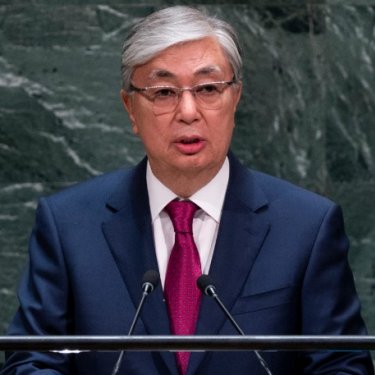On the eve of UPR, Kazakhstan urged to decriminalize press offences

On the eve of Kazakhstan’s Universal Periodic Review (UPR) by the UN Human Rights Council, Reporters Without Borders (RSF) reiterates its call to President Kassym-Jomart Tokayev to stop persecuting journalists and to embark without further delay on the reforms needed to develop press freedom.
It is time for Kazakhstan to rid itself of the heritage of three decades of absolute rule and censorship under President Nursultan Nazarbayev, who finally resigned in March and made way for Tokayev, whose speeches reflect a degree of openness to the idea of democracy. Tomorrow’s UPR offers Kazakhstan a unique occasion to give concrete pledges to respect freedom of expression and improve its international image.
There has been some good news in recent months, suggesting that the authorities are making an effort. Yaroslav Golyshkin, a provincial newspaper editor detained since 2015, was released in return for payment of a fine. And a court awarded compensation to another provincial newspaper editor, Elena Kuznetsova, after recognizing that her conviction on a charge of defamation was illegal.
New intimidation techniques
But this modest progress is completely overshadowed by the scale of the violations still taking place. The press freedom group Adil Soz reports that, in addition to threats, attacks and judicial and administrative harassment, a total of 58 journalists were arrested in the first nine months of 2019 – half of them while covering events.
RSF condemns the many cases of harassment of journalists including Vlast.kz reporter Daniar Moldabekov, and three reporters for the Kazakh version of RFE/RL, Svetlana Glushkova, Sanya Toiken and Sanat Nurbek.
President Tokayev never commented on the massive wave of arrests of journalists in May, June and July. Worse still, new methods for intimidating journalists appeared during the summer.
Masked men with umbrellas obstructed reporters during demonstrations on 6 July, preventing them from conducting interviews and filming arrests. Then a group of female athletes prevented Kazakhstan’s Bureau for Human Rights from holding a press conference on 22 July. They attacked journalists and stole or damaged their equipment with complete impunity.
Internet under control
What with inaccessible news sites, blocked social networks and faulty mobile phone connections, the new government has not hesitated to resort to massive Internet censorship during the peaceful rallies organized throughout the country – especially on 9 May – by Mukhtar Ablyazov, a self-exiled oligarch and government opponent.
This summer, Internet users had to install a “national security certificate” to avoid losing their Internet access. On the pretext of combatting terrorism, the “certificate” facilitated online surveillance by the Kazakh intelligence services, especially surveillance of social networks, which are the main channels of communication and last space left for free speech. The “certificate” was finally described as just a “test” and was officially dropped on 6 August. But those “certificates” that have not been uninstalled can still act as spies.
Media gag laws
RSF also condemns the 27-month prison sentence that Amangeldy Batyrbekov, the editor of the local online newspaper Saryaghash Info in the southern Turkestan region, received in September. Known in the region for his investigative reporting on local government officials and judges, he was convicted for a series of Facebook posts about alleged corruption within the education system in the district of Keles. His appeal was due to be heard on 5 November but was postponed until 12 November, after the UPR.
During the previous UPR in 2014, the Kazakh authorities ignored most of the recommendations concerning press freedom and free speech, claiming that most of them had already been implemented. Despite the government’s repeated promises, defamation has still not been decriminalized.
RSF therefore urges the Kazakh government to:
- Immediately and unconditionally release all professional and non-professional journalists who are being held pending trial or who have been convicted simply for exercising their profession or their right to free speech and the freedom to inform.
- End judicial and administrative harassment of media, journalists and independent bloggers.
- Take all necessary steps to ensure that those responsible for acts of aggression against news and information providers are identified, prosecuted and punished.
- Reform the criminal code so as to decriminalize press offences and defamation.
- Amend article 174 of the criminal code, under which inciting hate, including social hate, is punishable by up to 10 years in prison. The definition of this crime is too vague and discourages journalists from tackling sensitive subjects.
- Amend Internet legislation so as to ensure that no website can be blocked without a court hearing that gives the website an opportunity to defend itself.
- Put a stop to the arbitrary censorship of social networks and to Internet cuts.
- Guarantee unrestricted Internet access throughout the country.
Kazakhstan is ranked 158th out of 180 countries in RSF’s 2019 World Press Freedom Index.


